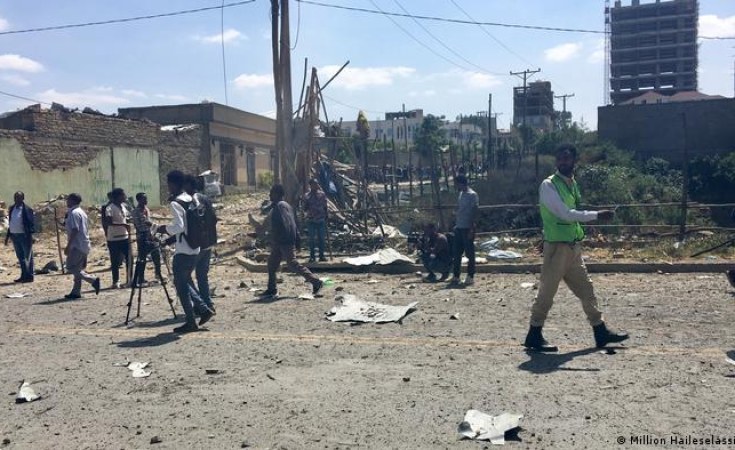Only negotiations will bring an end to the conflict in Ethiopia's northern Tigray region, mediators and security experts agree. But the latest escalation and involvement of Eritrean troops is a setback to peace.
African political and security analysts are warning that the latest escalation in the Tigray conflict and the reported movement of Eritrean troops into the northern Ethiopian region is a major setback to efforts to restore peace.
EU foreign policy chief Josep Borrell issued a similar warning on Twitter on Wednesday, "The EU urges once again all parties to forget about any military solution and join efforts for the benefit of their populations."
The US administration this week also condemned the escalation. "We have been tracking Eritrean troops' movement across the border ... and we condemn it," US Special Envoy for the Horn of Africa Mike Hammer said on Tuesday.
AU-lead negotiations
Accra-based Security expert Adib Saani told DW that all parties to the Tigray conflict must show a commitment to a peace process.
"No amount of talk can bring peace to the area unless all parties show the right level of commitment -- not just show it but demonstrate it, and that is what is lacking," he said.
Saani criticized the sentiments being expressed by the EU, US and the United Nations on the conflict, saying they lack a strong and concerted commitment.
"The international concerted effort we saw with Ukraine is not as we see with Ethiopia," he said. "This is also demonstrable of the fact that Africans would have to learn to address their own problems and not count on anybody from anywhere."
The African Union has been trying to broker peace between the Ethiopian government and Tigrayan forces. Hammer, the US envoy, has been helping to facilitate the process.
"There is no military solution to the conflict. The Ethiopian people have suffered too much already, and it is critically important that the parties participate in a robust African Union [peace] process," Hammer told journalists on Tuesday.
Two sides were willing to talk
The Tigray People's Liberation Front (TPLF) had initially opposed the decision by the AU to appoint its Horn of Africa envoy, Olusegun Obasanjo, as a mediator and cited his "proximity" to Ethiopia's Prime Minister Abiy Ahmed as an obstacle to fair talks.
However, earlier this month, the TPLF said it was ready to take part in peace Ethiopia's government had also signaled its support for the talks.
But on August 24, a ceasefire that had been in place since March was shattered by renewed fighting in Tigray.
UN told of 'war crimes'
On Tuesday, the UN Human Rights Council (HRC) said it had received a report by a panel of UN human rights experts that details war crimes in Ethiopia.
The UN International Commission of Human Rights Experts on Ethiopia detailed instances of extrajudicial killings, rape, sexual violence and the starvation of the civilian population since the Tigray conflict in November 2020.
"The Commission finds reasonable grounds to believe that, in several instances, these violations amount to war crimes and crimes against humanity,"
Ethiopia's Permanent Representative to the United Nations, Ambassador Zenebe Kebede, rejected the report in an interview with the AFP news agency.
"The only source they talked to is the TPLF itself. They wrote in their report what was dictated by the TPLF itself, otherwise there is not any single evidence that shows the government of Ethiopia used humanitarian aid as an instrument of war," Kebede said, "The report itself is self-contradictory and biased and doesn't pay any attention to the atrocities committed in Afar and Amhara regions, but solely focusing on Tigray."
Edited by: Benita van Eyssen


